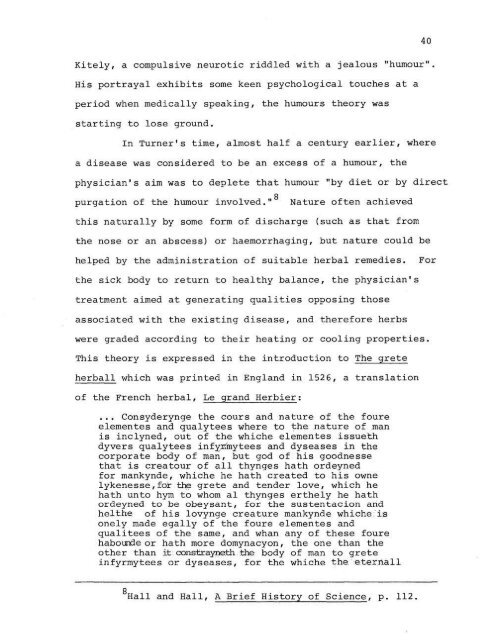Untitled - Memorial University's Digital Archives Initiative - Memorial ...
Untitled - Memorial University's Digital Archives Initiative - Memorial ...
Untitled - Memorial University's Digital Archives Initiative - Memorial ...
You also want an ePaper? Increase the reach of your titles
YUMPU automatically turns print PDFs into web optimized ePapers that Google loves.
Kitely, a compulsive neurotic riddled with a jealous "humour".<br />
His portrayal exhibits some keen psychological touches at a<br />
period when medically speaking, the humours theory was<br />
starting to lose ground.<br />
40<br />
In Turner' 5 time, almost half a century earlier, where<br />
a disease was considered to be an excess of a humour, the<br />
physician's aim was to deplete that humour "by diet or by direct<br />
purgation of the humour involved."S Nature often achieved<br />
this naturally by some form of discharge (such as that from<br />
the nose or an abscess) or haemorrhaging, but nature could be<br />
helped by the administration of suitable herbal remedies. For<br />
the sick body to return to healthy balance, the physician's<br />
treatment aimed at generating qualities opposing those<br />
associated with the existing disease, and therefore herbs<br />
were graded according to their heating or cooling properties.<br />
This theory is expressed in the introduction to The grete<br />
herball which was printed in England in 1526, a translation<br />
of the French herbal, Le grand Herbier:<br />
... Consyderynge the cours and nature of the foure<br />
elementes and qualytees where to the nature of man<br />
is inclyned, out of the whiche elementes issue:th<br />
dyvers qualytees infr-Emytees and dyseases in the<br />
corporate body of man, but god of his goodnesse<br />
that is creatour of all thynges hath ordeyned<br />
for mankynde, whiche he hath created to his owne<br />
lykenesse, for the grete and tender love, which he<br />
hath unto hym to whom al thynges erthely he hath<br />
ordeyned to be obeysant, for the sustentacion and<br />
helthe of his lovynge creature mankynde whiche "is<br />
onely made egally of the foure elementes and<br />
qualitees of the same, and whan any of these foure<br />
habourle or hath more domynacyon, the one than the<br />
other than it o:mstrayneth :the body of man to grete<br />
infyrmytees or dyseases, for the whiche the eternal1<br />
BHall and Hall, A Brief History of Science, p. 112.

















